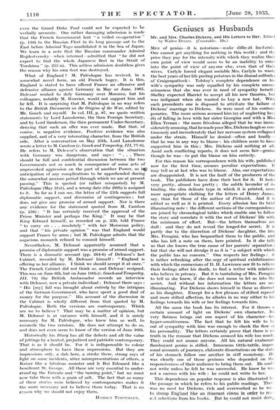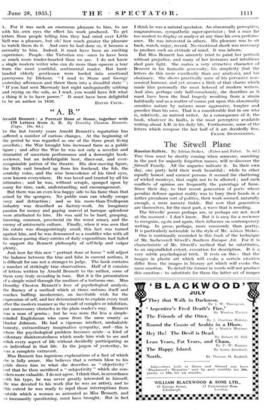Geniuses as Husbands MEN of genius—it is notorious—make difficult husbands.
One cannot get anything for nothing in this world : and the price they pay for the intensity with which they realize their own point of view would seem to be an inability to enter into the point of view of an3 one else, even that of their wives. Carlyle forced elegant sociable Mrs. Carlyle to waste the best years of her life peeling potatoes in the dismal solitudes of Craigenputtock : Tolstoy's complete dependence on his wife's sympathy was only equalled by his complete uncon- sciousness that she was ever in need of sympathy herself : Shelley expected Harriet to accept all his new theories, but was indignant when she wanted to buy a new hat. With such precedents one is disposed to attribute the failure of Dickens' marriage to Dickens. So were most of his contem- poraries. The more serious accused him (a) of neglecting her; (b) of falling in love with her sister Georgina and with a Miss Ellen Ternan : the more frivolous alleged that he was incon- siderately amusing, that he made poor Mrs. Dickens laugh so con- tinuously and immoderately that her nervous system collapsed under the strain. Himself he denied—often and loudly— that he was in any way to blame : his children seem to have supported him in this ; Mrs. Dickens said nothing at all. Amid such conflicting reports, it does not seem fair—genius though he was—to put the blame on him entirely.
For this reason his correspondence with his wife, published now for the first time, arouses peculiar expectations. It may tell us at last who was to blame. Alas, our expectations are disappointed. It is not the fault of the producers of the book. The publishers have done their best for it. It looks very pretty, almost too pretty ; the subtle lavender of its binding, the slim delicate type in which it is printed, seem more appropriate clothing for the letters of Henry Jaines, say, than for those of the author of Pickwick. And it is edited as well as it is printed. Every allusion has its brief illuminating note : the different sections of the correspondence are joined by chronological tables which enable one to follow the story and correlate it with the rest of Dickens' life with the minimum of effort. But—the letters themselves are dull : and they do not reveal the longed-for secret. It is partly due to the discretion of Dickens' daughter, the late Mrs. Perugini, who has bequeathed them to the public, and who has left a note on them, here printed. In it she tells us that she knows the true cause of her parents' separation : but that she will not divulge it as it is " a subject with which the public has no concern." One respects her feelings : it is rather refreshing after the orgy of spiritual exhibitionism with which the connexions of D. H. Lawrence saw fit to relieve their feelings after his death, to find a writer with relations who believe in privacy. But it is tantalizing of Mrs. Perugini to tell us she knew, if she does not mean to let us into the• secret. And without her information the letters are un- illuminating. For Dickens shows himself in these as discreet as his daughter. Except for a few phrases of stilted reproof and more stilted affection, he alludes in no way either to his feelings towards his wife or her feelings towards him.
All the same the book has its interest. For it throws a certain amount of light on Dickens' own character. Its
very flatness brings out one aspect of his character—hi•: hyper-sensitiveness. The fact that he felt his wife to be out of sympathy with him was enough to check the flow of
his personality. The letters certainly prove that there is no truth in the rumour that Dickens amused his wife too much.
They could not amuse anyone. All his natural exuberant flamboyant genius is stifled. Innocuous tittle-tattle, imper- sonal accounts of journeys, elaborate dissertations on the state
of his stomach follow one another in stiff monotony. He was clearly one of those geniuses who depended on the responsiveness of their audience to bring them out. He could not write unless he felt he was successful. He knew he was not a success with his wife : he could not write to her.
This dependence on popular response is also illustrated b the passage in which he refers to his public readings. Thera was no need for Dickens, rich and overworked as he wa, to stump England like an itinerant circus in order to rea• o.:t selections from his books. But he could not resist doing it. For it was such an enormous pleasure, to him, to see with his . own eyes the effect his work produced. To get letters from people telling_ him they had cried over Little Nell was a pleasure, but oh ! how much greater the pleasure to watch them do it. And once he had done so, it became a necessity to him. Indeed, it must have been an exciting experience. People—the Victorian era—seem to have been so much more tender-hearted than we are. I do not know a single modern writer who can do more than squeeze a tear from the most youthful, sentimental reader. But hard- headed elderly gentlemen were hurled into emotional paroxysms by Dickenk. " I read to Stone and Georgy yesterday afternoon and threw them into a dreadful state " ; " If you had seen Macready last night undisguisedly sobbing and crying on the sofa, as I read, you would have felt what a thing it is to have power." It must have been delightful to be an author in 1850.
DAVID CECIL.







































 Previous page
Previous page